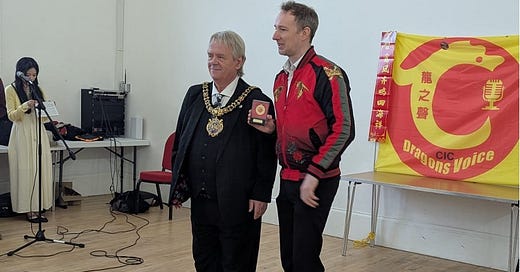I am blessed to have so many opportunities to be creative and productive. This month, despite miserable weather and distractions including a wedding in County Monaghan, I managed to get plenty done.
Output
I finished a new original song, titled ‘The FVSDA’:
This means I have already finished writing The Kev album 4 and will release it when I have done all the boring stuff. It should be on all the platforms by the end of spring.
I have also had some heartening Google reviews as The Kev:
Other work released this month includes a short story, an essay about my all-time favourite novels, and a classical guitar rendition of ‘Eternal Flame’ by The Bangles.
Activities
For me, paid work has always been the least exciting but most important thing. This is my busiest period of work since finishing an MBA in 2019. As well as an office job and a campus job, I have restarted private tutoring. My online Chinese lesson was on a cultural phenomenon that barely exists in the Western world:
And I sang a couple of Mandopop songs at a Chinese New Year event, attended by Manchester Lord Mayor Paul Andrews.
Moreover, I am working hard at studying Arabic, but don’t have much to show for it yet. It’s a dastardly but rewarding writing system to learn.
Wider World
Much of the modern world was built by Europe. The continent on the west of the Eurasian landmass was home to the enlightenment, which led to the Industrial Revolution, which produced the prosperity and convenience we currently enjoy.
Europe makes up for just 6.8 percent of the world’s land mass, but approximately 42 percent of the global population speaks a European language. Tim Marshall’s brilliant book ‘Prisoners of Geography’ attributes the continent’s success to many factors including a climate that is amenable to agriculture, cold winters that kill off germs, and relatively few natural disasters.
Since the start of the Cold War in the 1940s, Western Europe has been largely reliant on American military might for its security. But that looks likely to change under the erratic presidency of Donald Trump.
Britain has set out to increase spending on defence to 2.5% of GDP from April 2027. France has offered a nuclear shield to other European countries as a deterrent to aggression. And Friedrich Merz, having been elected as Germany’s chancellor, has pledged to achieve independence from the United States.
I am a long-term admirer of Paul Kingsnorth. He cited the problem of bigness as one of his reasons for voting to leave the European Union in 2016:
‘Whenever something is wrong,’ wrote Leopold Kohr in his classic book The Breakdown of Nations, ‘something is too big.’ Virtually everything in the EU is too big these days, and it shows. The impossibility of maintaining one financial model for 28 nations has required the EU to cast the people of its poorer periphery nations, from Ireland to Greece to Spain to Portugal, into debt peonage or mass unemployment in order to keep its superstate dream alive; something it has done with extreme ruthlessness.
Despite this, the developments of the past month have brought us closer to the necessity of a united European army. Unlike territories of a similar size, such as China and the United States, Europe has always been divided by languages and natural borders. However, bigness may become our only hope.





